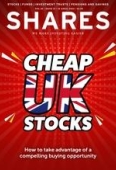Archived article
Please note that tax, investment, pension and ISA rules can change and the information and any views contained in this article may now be inaccurate.
How Fundsmith stacks up versus Nutshell and Blue Whale rivals

If you had £10,000 to invest in a single fund, which would you choose – one of the most popular with retail investors for more than a decade, or a relative new kid on the block with a similar asset allocation approach?
In a manner of speaking, it is what billionaire City grandee Michael Spencer challenged formidable money man and Fundsmith Equity (B41YBW7) founder Terry Smith at the end of 2023, throwing down the gauntlet with a £10,000 wager that a fund he backs can beat Smith’s fund during 2024.
Spencer is believed to have invested around £10 million of his own money in Nutshell Growth (BLP46Q1), a little-known fund that invests in a concentrated portfolio of long-term quality growth equities. Sound familiar?
Fundsmith, founded by Smith in 2010, has become hugely popular with retail investors, with £25.5 billion of assets managed, by doing along similar lines, buying shares in companies with sustainably high returns on capital, defendable market positions and that do not rely on debt to progress.
Nutshell was launched in May 2020, the brainchild of Mark Ellis, who runs the £30.7 million fund. Ellis uses a mix of human analysis and stock picking with AI (artificial intelligence) to calibrate his portfolio.
LIMITED CORRELATION
Investors might think that sharing a similar investment style would lead to plenty of equity crossover in their respective portfolios, an accusation levelled at Blue Whale Growth (BD6PG78) in the past, which also invests in top quality companies.
Now, as then, this is not really the case, and the same goes for Nutshell, sharing limited correlation with either Fundsmith or Blue Whale, as the graphic shows.
Yes, there are some names repeated, but not overly. Obesity drug-maker Novo Nordisk (NVO:NYSE) sits in both Fundsmith and Nutshell, while Nutshell and Blue Whale share stakes in Nvidia (NVDA:NASDAQ), while you might argue that owning either Visa (V:NYSE) or Mastercard (MC:NYSE) amounts to the same thing (both are in the Blue Whale portfolio top 10).
Microsoft, seen by many analysts as the chief winner in software AI, appears in all three funds, while they are collectively invested in the wider future of healthcare theme through companies like IDEXX Laboratories (IDXX:NASDAQ), Stryker (SYK:NYSE), Equasens (EQS:EPA), Sartorius (SRT:XTR) and the previously mentioned Novo Nordisk.
But when it comes to consumers, the bias in the Fundsmith and Blue Whale portfolio towards luxury brands differs hugely from Nutshell’s take, which owns a stake in Canadian discount retailer Dollarama (DOL:TSE).
What we know so far is that Nutshell’s year to date performance of 10.3%, according to Morningstar data (to 10 April) is marginally ahead of Fundsmith’s 8% total return (share price growth plus reinvested dividends). Interestingly, Blue Whale has beaten both so far in 2024, up 16.6%, says Morningstar, possibly a result of its greater lean towards technology stocks.
WHAT’S BEEN MOVING THE DIAL
According to Nutshell, stakes in Nvidia, Arista Networks (ANET:NYSE) and Alpha Group International (ALPH:AIM) have been driving performance this year, although a holding in Hong Kong-listed China Overseas Property (2669:HK) hasn’t helped.
Holdings in companies such as Novo Nordisk, Microsoft (MSFT:NASDAQ) and food producer McCormick (MKC:NYSE) helped lift Fundsmith Equity, with IDEXX Laboratories and Nike (NKE:NYSE) dragging on performance.
According to Blue Whale manager Stephen Yiu, its performance this year has been driven by investment in key themes, such as AI – Nvidia and Meta (META:NASDAQ), silicon sovereignty – Applied Materials (AMAT:NASDAQ) and LAM Research (LRCX:NASDAQ), and inflation beneficiaries (Visa and Mastercard).
We have no idea whether Smith took up Spencer’s £10,000 wager, but it hardly matters, whoever wins the bet, a single year of data is not a large enough sample size to draw any meaningful conclusions.
What is more important is performance over multiple years, and this is where comparisons become less clear. Over the relatively short period of three years (as far back as Nutshell data goes), Fundsmith’s performance lags both Nutshell and Blue Whale.
Over five years, a timeframe most longer-term fund managers see as reasonable for analysis, Blue Whale also trumps Fundsmith, yet over a 10-year period, Fundsmith’s annualised 15.9% is exceptional. That decade-long performance is close on 50% better than the fund’s Global Large-Cap Growth Equity category, based on data from investment platform AJ Bell.
A sign that Fundsmith’s approach is tiring? It will be several years before investors can judge either Nutshell or Blue Whale over a decade, and presumably, both would be chuffed if they get close to Fundsmith’s performance.
Fundsmith may have drawn a little criticism after a spell failing to outperform wider indices, but it remains one of the most popular funds with private investors in Britain, with little indication of that changing.
WHAT FUNDSMITH LOOKS FOR
- high quality businesses that can sustain a high return on operating capital employed
- businesses whose advantages are difficult to replicate
- businesses which do not require significant leverage to generate returns
- businesses with a high degree of certainty of growth from reinvestment of their cash flows at high rates of return
- businesses that are resilient to change, particularly technological innovation
- businesses whose valuation is considered to be attractive.
Disclaimer: Financial services company AJ Bell referenced in the article owns Shares magazine. The author of the article (Steven Frazer) and the editor of the article (Tom Sieber) own shares in AJ Bell. Steven Frazer has a personal holding in Fundsmith Equity and Blue Whale Growth.
Important information:
These articles are provided by Shares magazine which is published by AJ Bell Media, a part of AJ Bell. Shares is not written by AJ Bell.
Shares is provided for your general information and use and is not a personal recommendation to invest. It is not intended to be relied upon by you in making or not making any investment decisions. The investments referred to in these articles will not be suitable for all investors. If in doubt please seek appropriate independent financial advice.
Investors acting on the information in these articles do so at their own risk and AJ Bell Media and its staff do not accept liability for losses suffered by investors as a result of their investment decisions.
Issue contents
Danni Hewson
Feature
Great Ideas
News
- Lloyds Bank cuts risk monitoring in effort to drive change
- Lok’n Store shares leap on Shurgard cash offer
- Shares in personal care firm PZ Cussons hit 20-year low
- Has Associated British Foods-owned Primark maintained its momentum?
- Prospects for US interest rate cuts reduced as inflation remains sticky
- Service sector inflation undermines market rally
- Can Amazon continue to beat ‘The Street’?
- What have we learned from the US banks’ first-quarter updates?
 magazine
magazine








